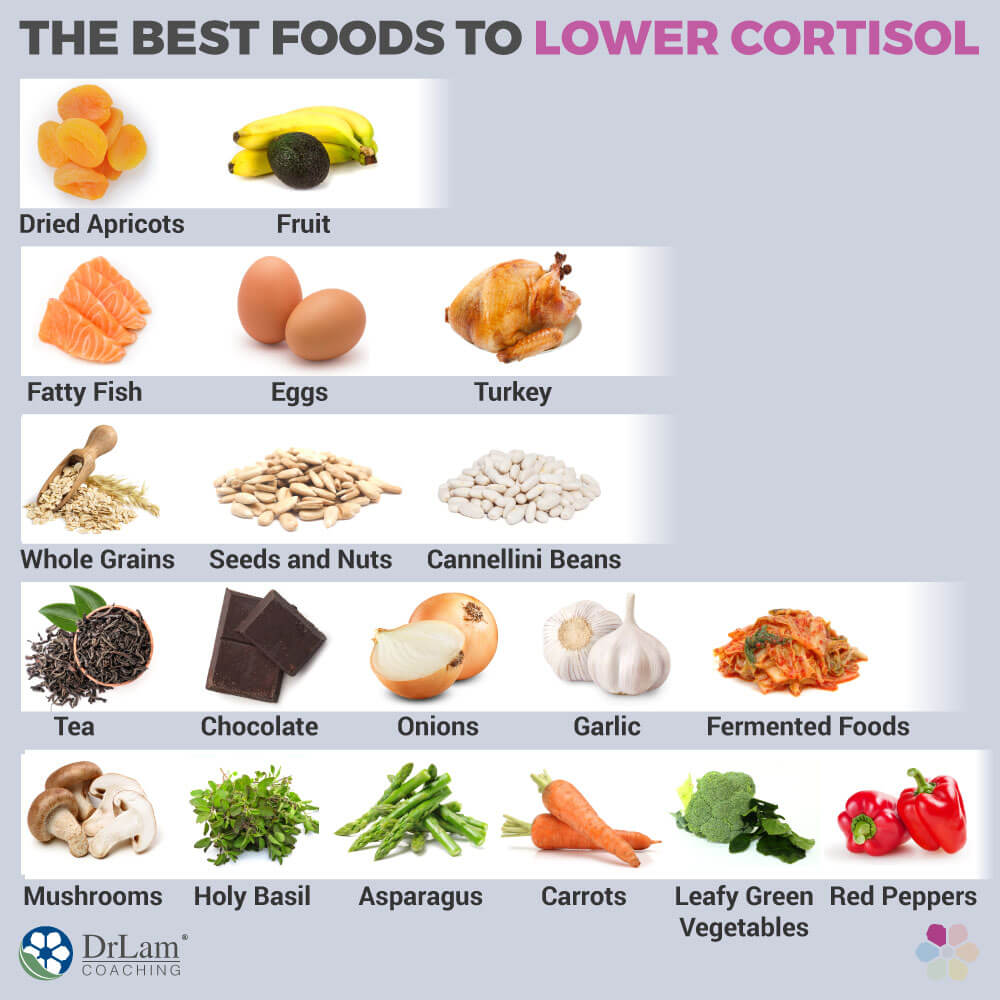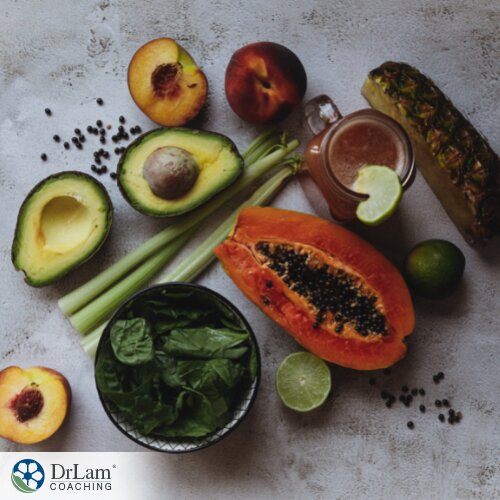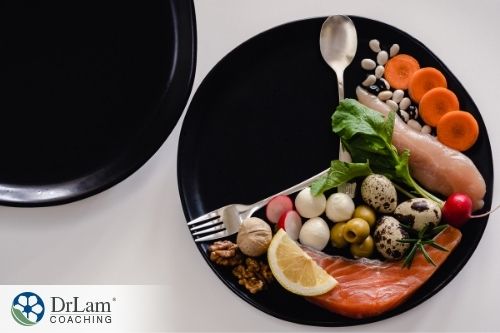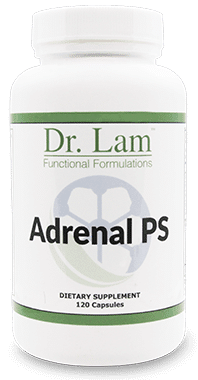
 Increased cortisol production is your body’s natural response to stress. This increase in cortisol production is part of your body’s NeurEndoMetabolic stress response and helps you deal with stress on multiple levels. But sometimes your cortisol production does not decrease once a stressful period passes. Or, as in the case with prolonged stress, your body’s heightened cortisol production continues, and sometimes even increases. This, unfortunately, could result in adrenal fatigue, a condition that could contribute to various health issues. These issues include mental health issues, gastrointestinal issues, autoimmune disorders, and even certain types of cancer. Foods to lower cortisol levels can help in this situation.
Increased cortisol production is your body’s natural response to stress. This increase in cortisol production is part of your body’s NeurEndoMetabolic stress response and helps you deal with stress on multiple levels. But sometimes your cortisol production does not decrease once a stressful period passes. Or, as in the case with prolonged stress, your body’s heightened cortisol production continues, and sometimes even increases. This, unfortunately, could result in adrenal fatigue, a condition that could contribute to various health issues. These issues include mental health issues, gastrointestinal issues, autoimmune disorders, and even certain types of cancer. Foods to lower cortisol levels can help in this situation.
Foods to lower cortisol contain elements that help with your body’s cortisol regulation. At the same time, they push down your cortisol production, helping you recover from stress. It's a win-win situation.
This article looks at the foods to lower cortisol that are easy to find and prepare.
It's hard to understate the importance of a good diet. Many health issues can be managed with the right foods, including foods to lower cortisol. It's also usually a good idea to avoid sugar, processed foods, trans fats, and sugary drinks. These add to your adrenal load, increase the number of oxidants in your body, and could contribute to inflammation, weight gain, mental health issues, and more.
Before looking at specific foods, it will help to know how a few food groups affect cortisol in general.
Many people tell you to stay away from carbohydrates, and often with good cause. But refined carbohydrates are the ones you should be wary of. On the other hand, unrefined carbohydrates like whole grains and those found in fruit and vegetables are fiber-rich, complex carbohydrates that are good for you. Furthermore, they contain an amino acid called tryptophan that plays a role in melatonin production in your brain. You need this hormone to get a good night’s rest. Your body needs enough of the right type of sleep to restore itself. So don't be afraid of having some whole grains.
Almost half the American population does not get enough magnesium from their diet. And when stressed, your magnesium levels tend to become depleted more quickly via sweat and urine. Lowered magnesium levels increase your stress levels. Which can form a negative cycle.
You can mitigate this situation by incorporating magnesium-rich foods into your diet. Avocado, leafy green vegetables, and certain whole grains are great sources.
Foods to lower cortisol include food high in omega-3 fatty acids. People with low levels of these fatty acids tend to have higher cortisol levels. Once they increase their omega-3 consumption, however, they tend to experience a drop in the levels of this stress hormone. Omega-3 rich foods include fatty fish like mackerel and salmon, flaxseeds, and walnuts.
Because of its profound effect on full-body health, immunity, and the gut-brain connection, looking after your gut health is paramount when dealing with stress. In short, you need to take care of the flora in your gut because an imbalance could result in health conditions, including a cortisol increase. Foods to lower cortisol thus include those high in probiotics. Good examples include sauerkraut, yogurt, kefir, and kimchi.

These are the best foods to lower cortisol to add to your grocery list.
Rich in magnesium, dried apricots help relax muscles and ease heart palpitations. They also give your immune system a boost due to their high vitamin C content. Their high fiber content helps with digestive health
Fatty fish like salmon, mackerel, herring, cod, and sardines are all high in omega-3 fatty acids and help to keep your cortisol and adrenaline levels stable. They also promote heart health.
Leafy green vegetables like kale, spinach, cauliflower, and broccoli contain vitamin C, magnesium, and folate. Vitamin C is a great antioxidant; magnesium helps stabilize cortisol levels; and folate plays a role in dopamine and serotonin production in the brain. Collard greens also have a high vitamin K content. This vitamin plays a role in the regulation of your blood calcium levels, blood clotting, and bone formation. Microgreens and sprouts contain significant amounts of enzymes that help the digestive process.
Whole grains take a while to digest. In doing so, they ensure a constant, steady release of the happiness hormone serotonin. In addition to this, they also help to stabilize your blood sugar levels. You can choose whole grains like oatmeal, whole-wheat bread, pasta, or crackers, brown rice, quinoa, buckwheat, and barley. Amaranth, like quinoa, is an ‘ancient grain’. It is high in fiber, protein, and B vitamins.
Green or black teas are great coffee alternatives and a good source of vitamin C. A study on black tea shows it lowers cortisol levels. Furthermore, although green tea is relatively high in caffeine, it is adaptogenic. This means it improves your body’s ability to deal with stress and helps restore its physiological functions. However, be aware that you shouldn't drink green or black tea if you're sensitive to caffeine and overstimulated as it could cause you to stay up at night and cause further stress to your adrenals.
Herbal teas like chamomile, valerian, peppermint, or rose tea all have anti-anxiety properties and help you sleep better. Lemon balm tea may also encourage and improve sleep and calm your sympathetic system down.
Eggs contain omega-3 fatty acids, choline that helps with brain function, and tryptophan that helps with serotonin release.
Turkey, a good lean protein source, also contains Tyrosine. This amino acid helps boost dopamine and norepinephrine levels in the brain and helps with concentration.
Many seeds are good sources of magnesium and help with emotion regulation. Pumpkin seeds, sunflower seeds, and flaxseed are readily available and easy to incorporate into your diet.
Nuts, like walnuts and almonds, contain omega-3 fatty acids that promote heart and brain health, reduce inflammation, and help combat stress.
Fermented foods like kimchi and sauerkraut, rich in probiotics, help the gut flora and may help reduce anxiety and depression. They also contain various vitamins, including vitamins A, B1, B2, and C. In addition to this, fermented foods are rich in antioxidants and amino acids.
Many fruits are great foods to combat cortisol.

Dark chocolate may help reduce cortisol levels, according to research. This sweet treat is rich in minerals, iron, copper, manganese, and zinc while containing very little caffeine. The theobromine in dark chocolate may result in a ‘feel-good’ feeling. Do not, however, overconsume dark chocolate because it still contains a significant amount of sugar.
We tend to forget the various medicinal properties found in the foods we eat. As a result, we do not practice mindfulness when it comes to what we put into our bodies. We should be more consistent in taking note of the various beneficial properties of our food. And of course, let us not forget to drink enough water.
If you are suffering from adrenal fatigue or one of the many conditions associated with it, here are a few things you can do to help alleviate the situation.

If you would like to know more about or need assistance with foods to lower cortisol, the team at Dr. Lam Coaching can help. We offer a free** no-obligation phone consultation at +1 (626) 571-1234 where we will privately discuss your concerns. You can also send a question through our Ask The Doctor System by clicking here.

Modulate cortisol naturally
There is no quick cure for adrenal fatigue. Foods to lower cortisol do, however, help control your cortisol levels. A constant, high cortisol production is one of the main factors resulting in adrenal fatigue and other health issues. These foods thus provide adrenal support by reducing cortisol production.